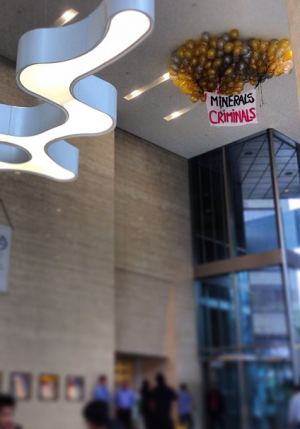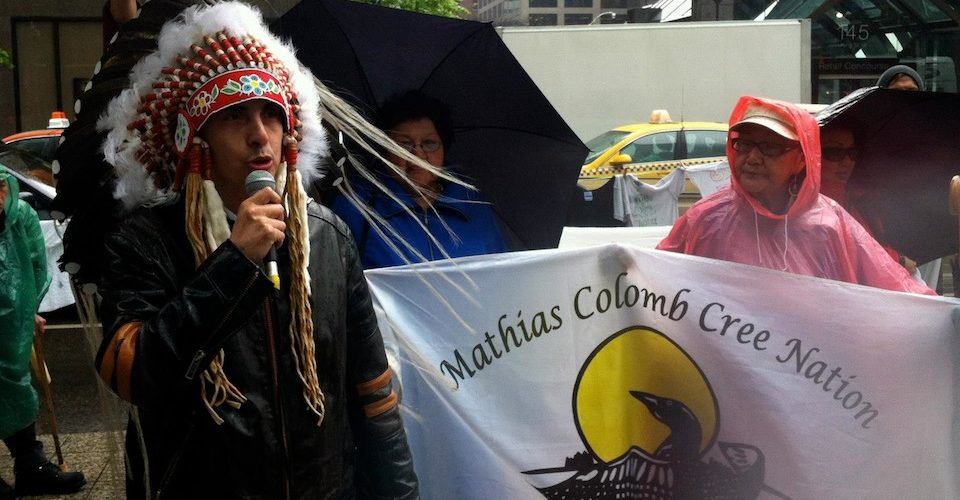The scene was absurd: four activists, each with a bundle of 75 black and gold helium-filled balloons, riding an escalator. As we reached the top, we clipped our banner to the bundles and let go, watching our work rise slowly toward the hundred-foot ceiling of the lobby of a downtown Toronto office tower. Suddenly there were security guards rushing toward us. One of them jumped to make a grab for the bottom edge of the banner. We held our breath. He missed by mere inches and groaned.
The scene was absurd: four activists, each with a bundle of 75 black and gold helium-filled balloons, riding an escalator. As we reached the top, we clipped our banner to the bundles and let go, watching our work rise slowly toward the hundred-foot ceiling of the lobby of a downtown Toronto office tower. Suddenly there were security guards rushing toward us. One of them jumped to make a grab for the bottom edge of the banner. We held our breath. He missed by mere inches and groaned. And then for just a moment, everyone in the lobby was standing still, staring up, as our huge painted banner rose until the balloons bumped and jostled against the ceiling. The bold red letters made our message clear: “HUDBAY MINERALS, CORPORATE CRIMINALS.”

The banner announcing “Hudbay Minerals, Corporate Criminals” stayed up in the lobby of the building where Hudbay’s shareholders were meeting for two hours until the company was able to remove it.
Outside on King Street, we joined the group of protesters who had already been standing in the pouring rain for more than two hours. A banner just like the one we had raised inside was stretched out, soaked, between two elders from the Mathias Colomb Cree Nation. They had traveled from northern Manitoba to confront Hudbay at this shareholder meeting where important decisions were being made by people who may have a financial stake but whose lives will never be directly impacted by the actual workings of any of the company’s mines.
Hudbay Minerals is one of several Canadian-owned mining companies censured by environmental activists, human rights organizations and more recently by mainstream media for carrying out violent forced evictions, murdering a community leader who resisted one of their mines, robbing Indigenous peoples of their lands, supporting brutal police and security operations and criminalizing anyone who has tried to resist their mining projects around the world and here in Canada. Hudbay has gained increasing attention recently because they are the first Canadian company to be tried in Canadian courts for crimes committed at mines overseas.
I [Rachel] have been directly involved in supporting communities resisting Hudbay’s mines since 2010, when I traveled to Guatemala as part of a human rights delegation and had the chance to meet people in a Mayan Q’eqchi’ community impacted by a mine formerly operated by the company. One of those people was Angelica Choc, who is now at the centre of Choc vs. Hudbay, the groundbreaking lawsuit currently being heard by Canadian courts. Angelica’s journey through the Canadian justice system began with the murder of her husband in 2009. Her community’s struggle against Canadian-owned mining companies goes back decades and is interwoven with armed conflict, genocide, government corruption, and Canada’s international development policy.
The history of the Fenix nickel mine, on the shores of Lake Izabal in western Guatemala, began in the 1960s when it was started by Inco, a Canadian company with a deep involvement in the Guatemalan government’s efforts to wipe out opposition. The Canadian government provided significant financial support to Inco’s Guatemalan subsidiary while people who protested or organized against the mine were killed, kidnapped, threatened, and whole communities were forcibly evicted from lands that had been their traditional territory for generations. Inco shut down mining operations in the 1980s, and the Fenix mine site was purchased by two Canadian companies – first Skye Resources in 2004 and then Hudbay in 2008. Shortly after the announcement of a lawsuit against Hudbay for negligence concerning violent acts committed by its employees and subsidiaries, Hudbay sold the Fenix mine to Russian company Solway Group at a $290 million loss.
The banner lift I organized in Toronto in the spring of 2013 was staged for the annual Hudbay shareholder meeting. It was an opportunity for organizations like the Mining Injustice Solidarity Network to counter the company’s media spin and to make evident – if only for the few hours that the crowds assembled outside and the banner floated near the 100 foot high lobby ceiling – that there was a bigger story at play than the record growth investment and corporate social responsibility initiatives that Hudbay was announcing inside. It was one small part of a series of actions and events that tied together Angelica’s quest for justice and that of the Mathias Colomb Cree Nation (MCCN) in Manitoba.

Leahjane Robinson with 300 balloons, moments before packing them into a uhaul to drive downtown to Hudbay’s shareholder meeting. Photo by Ashling Ligate.
MCCN has never been consulted by Hudbay or the province of Manitoba regarding the company’s mining operations on their territory. In an effort to assert their claim to the land and prevent Hudbay from carrying out their operations without permission, Chief Arlen Dumas formally issued stop work orders against the company in January and March of 2013, and band members organized peaceful gatherings at the mine site where they held drumming and singing ceremonies.
Hudbay responded by obtaining injunctions against the community and by launching a multi-million dollar lawsuit against Chief Dumas. The result of the company’s retaliatory actions is that MCCN people, who live off the land, have been instantly criminalized and held in contempt of court for trying to maintain their livelihood. Because of a mining operation they don’t want and never agreed to, they can no longer legally hunt and fish on their own land. MCCN has since delivered formal eviction notices to Hudbay and the Province of Manitoba.
Clayton Thomas-Muller, a member of the Pukatawagan Cree Nation and campaigner with Idle No More & Defenders of the Land, also came into town to stand with protesters outside Hudbay’s Toronto meeting. He addressed the crowd: “Investing in disputed Indigenous Lands, not respecting our nations’ right to Free, Prior and Informed Consent, trying to use the courts to suppress our Cree Nations’ sovereign right to protect our lands and water, are all signalers that the board and CEO of Hudbay are negligent, uninformed and morally bankrupt.” The community of Pukatawagan is located less than a hundred kilometres from the mine site.
Hudbay’s actions against MCCN, first ignoring the community’s right to determine what happens on their land, and later responding to resistance with significant legal threats, is heavy-handed and repressive, but less overtly violent than the threats faced by Angelica Choc’s community and those nearby. In 2007, Mayan farmers near the Fenix mine site were forced from their lands by hundreds of armed men from police, military, and private security forces who then burned down their homes.
In a village called Lote Ocho, eleven women were gang raped by the police, army, and security forces hired by Hudbay during an attempted eviction. The Canadian Ambassador to Guatemala attempted to discredit documentary film evidence of these violent evictions, claiming that the scenes were staged, or were filmed during the country’s armed conflict decades earlier. A Canadian court later found him guilty of slander, and ordered both the Ambassador and the Canadian Government to pay almost $10,000 in damages and costs to the filmmaker.
Angelica Choc addresses the supporters gathered outside of the courthouse where the trial began to hold Canadian company Hudbay accountable for the death of her husband. Also pictured: Grahame Russell from Rights Action. Photo by Veronica Díaz.
Two years later, in the face of another round of possible evictions, Angelica Choc’s husband Adolfo Ich Chamán, a community leader and outspoken critic of the mining company’s operations, was shot and killed by security forces. On the same day, German Chub was shot and permanently injured. These incidents, along with the brutal gang-rapes in Lote Ocho, are part of the case against Hudbay currently being heard in the Superior Court of Ontario. There are currently three lawsuits against the company, all for negligence resulting in death or significant harm.
Angelica’s message to Hudbay, which she shared with those who came to support her during a Toronto court appearance, is unflinching. “You made a mistake with me because I did not remain silent with my arms crossed…I demand justice.” She is a powerful speakerher words and her emotions impacted the crowd deeply as they heard about the brutality her community, like many others, has experienced in their efforts to resist violations of land and human rights.
“They need to pay for all the damage caused to my family and our communities. What Hudbay has done is deplorable. Even now they hide behind walls, refusing to accept the damages caused in Guatemala. I call upon everyone, and even more so, my Indigenous peoples, who are here [gathered in Toronto] right now, to remember who we are, where we come from and where we are going. I know this is not only the case in Guatemala, and I am not working, I am not fighting, only for Guatemala. This struggle is for the whole world, to defend the earth.”
On the day of her court appearance, in solidarity with Angelica and the other claimants, local Idle No More organizers led a round dance outside the courtroom. Members of the Mining Injustice Solidarity Network hung up t-shirts and sweaters on a clothesline as a way of “airing Hudbay’s dirty laundry.” Each piece of clothing had been painted by someone in Canada with messages about Hudbay’s activities, including a shirt painted by Angelica the night before. Photographs of this clothesline have since appeared in numerous media stories about the court case and the status of Hudbay’s corporate reputation.
A few of the pieces created to express solidarity with the plaintiffs and to air Hudbay’s dirty laundry. Photo by Leahjane Robinson.
Although the progress of the Choc vs. Hudbay case through the Canadian courts is a legal victory for the claimants and the lawyers representing them, back in the communities surrounding the Fenix mine repressive threats have intensified. Communities and families have been deliberately divided by offers of money and by campaigns of misinformation spread by mine officials and the government.
As disturbing as it is that these claimants are experiencing threats, it comes as little surprise to those of us who have worked on mining resistance. Unfortunately, Canadian mining companies regularly act illegally and with impunity in repressing resistance. This is especially easy to do in Guatemala, a country with one of the highest rates of impunity in the world. It is also a country where human rights activists and those organizing around the defense of land are routinely targets of violent attacks and murders.
Angelica Choc holds up the shirt she created for the laundry line. Photo by Monica Gutierrez.
Angelica knows that it will take the voices and commitment of many Canadians to make a change in the actions of Canadian-owned companies operating in her country. Surprisingly few Canadians realize that the majority of mines around the world are owned by companies based here, or the magnitude of the impact these mines are having.
To many Mayan peoples in Guatemala, the abuses carried out by Canadian companies on their land, across Central America, and globally are understood to be simply one part of a long and violent history of colonization, which they have been fighting against for hundreds of years.
Increasingly, settlers (non-Native people) in Canada are realizing what Indigenous peoples have been saying for a long time – these aren’t accidents, or the story of a few bad apples. If we’re going to change the way these companies act, we’ll need to challenge complex systems with a multitude of players that serve to concentrate power and resources in the hands of a few, often at the expense of Indigenous peoples.
And we need to acknowledge that, knowingly or not, we are all complicit in these harms, whether through the investments of our pension plans, the actions of our elected officials, the jewelry or electronics we buy, or by our tacit acceptance of systematic racism, colonialism and other oppressive, violent forces. It will be a long struggle to reverse these patterns.
The last time Angelica was in Toronto, she and I ate an early breakfast of pupusas in my kitchen before she left for the airport. We didn’t speak about much, but there was a weight to our conversation. We both knew just how dangerous it had been for her to come to Canada, and the risks she faced as she headed back to her community. We both knew that there is a very real threat of more evictions now that the mine has new owners. There was little I could say except to feebly send her off with a hug and a “please take care.”
Rachel is a community builder, organizer, artist, performer, wordsmith, and facilitator. She spends much of her time working within environmental justice movements, and, more specifically, has been engaged for a number of years in activism that opposes the harmful effects and practices of the Canadian extractive industry.
Joanne is a writer and facilitator from the Maritimes now living in Toronto. Her fiction, poetry, and non-fiction work has been included in a variety of national and regional publications and on-line projects.













